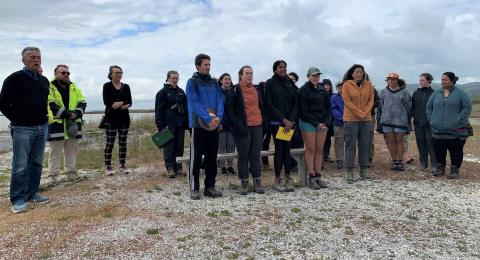Adding an Agribusiness minor at UNH to your degree will enhance your understanding of the business side of agriculture, providing valuable skills in management, marketing and finance tailored to the agricultural industry and offering insights into the economics of food production, supply chain management and sustainable practices. The minor is ideal for you if you're seeking a competitive edge in the agricultural sector, as the agribusiness minor broadens career opportunities and entrepreneurial potential.
What is agribusiness?
In the agribusiness minor, you’ll be introduced to the economics and management of agricultural and other natural resource businesses. You’ll study marketing, accounting, land use, and policy. Combining this minor with a major such as business, environmental sciences, forestry or sustainable agriculture can prepare you for work in the public or private sector, including with governmental agencies and nonprofits.
Why study agribusiness at UNH?
You’ll work closely with faculty and will be encouraged to participate in research projects. Upon graduation, you’ll be qualified for a wide variety of opportunities within a growing field. Private business, public institutions and government agencies have been creating a demand for specialists trained in areas such as natural resource development, land- and water-use policy, natural resource and small business management, and agricultural, fisheries and forestry marketing.
Potential career areas
- Agricultural, fisheries and forestry marketing
- Business
- Community development
- Environmental conservation
- Environmental planning and consultation
- Farming
- Land- and water-use policymaking
- Ranching
- Retail insurance and financial agencies
Curriculum & Requirements
The agribusiness minor is designed to provide students in disciplines other than environmental and resource economics with training in the economics and management of agricultural and other natural resource business firms. This program prepares students to work for private companies, governmental agencies, or nonprofit, nongovernmental organizations. Students who are interested in operating their own businesses will also find this minor very useful. The courses in the agribusiness minor emphasize the applications of economic and business management principles.
For additional information, contact John M. Halstead, Environmental and Resource Economics Program Coordinator, 168 James Hall, (603) 862-3914.
Academic policies related to Minors.
| Code | Title | Credits |
|---|---|---|
| Required Courses | ||
| ACC 501 | Survey of Accounting | 4 |
| ANSC 548 | Agricultural Business Management | 4 |
| NR 411 | Environmental and Resource Economics Perspectives (or equivalent) 1 | 4 |
| NR 607 | Land Economics Perspectives: Uses, Policies, and Taxes | 4 |
| MKTG 530 | Survey of Marketing | 4 |
- 1
NR 411 cannot be taken for credit if credit has been earned for ECON 402.






